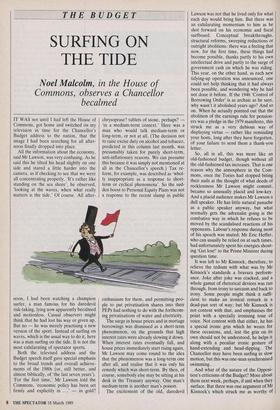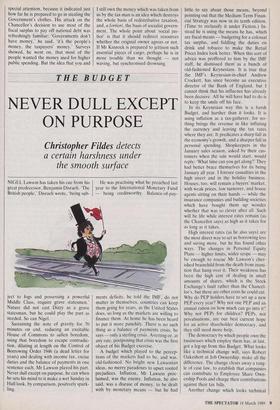THE BUDGET
SURFING ON THE TIDE
Commons, observes a Chancellor becalmed
IT WAS not until I had left the House of Commons, got home and switched on my television in time for the Chancellor's Budget address to the nation, that the image I had been searching for all after- noon finally dropped into place.
All the information about the economy, said Mr Lawson, was very confusing. As he said this he tilted his head slightly on one side and stared a little harder into the camera, as if checking to see that we were all concentrating properly. 'It's rather like standing on the sea shore', he observed, `looking at the waves, when what really matters is the tide.' Of course. All after- noon, I had been watching a champion surfer, a man famous for his daredevil risk-taking, lying now apparently becalmed and motionless. Casual observers might think that he had lost his way or given up. But no — he was merely practising a new version of the sport. Instead of surfing on waves, which is the usual way to do it, here was a man surfing on the tide. It is not the most exhilarating of spectator sports.
Both the televised address and the Budget speech itself gave special emphasis to the broad trends and overall achieve- ments of the 1980s (or, still better, and almost biblically, of 'the last seven years'). `For the first time,' Mr Lawson told the Commons, 'economic policy has been set firmly and explicitly in ... — in gold? chrysoprase? tablets of stone, perhaps? `in a medium-term context' Here was a man who would talk medium-term or long-term, or not at all. (The decision not to raise excise duty on alcohol and tobacco, predicted in this column last month, was presumably taken for purely short-term, anti-inflationary reasons. We can presume this because it was simply not mentioned at all in the Chancellor's speech.) Tax re- form, for example, was described as 'whol- ly inappropriate as a response to short- term or cyclical phenomena'. So the sud- den boost to Personal Equity Plans was not a response to the recent slump in public enthusiasm for them, and permitting peo- ple to put privatisation shares into their PEPs had nothing to do with the forthcom- ing privatisation of water and electricity.
The surge in house prices and in mortage borrowings was dismissed as a short-term phenomenon, on the grounds that high interest rates were already slowing it down. When interest rates eventually fall, and house prices immediately start rising again, Mr Lawson may come round to the idea that the phenomenon was a long-term one after all, and realise that it was only his remedy which was short-term. By then, of course, somebody else may be sitting at his desk in the Treasury anyway. One man's medium-term is another man's poison.
The excitement of the old, daredevil Lawson was not that he lived only for what each day would bring him. But there was an exhilarating momentum to him as he shot forward on his economic and fiscal surfboard. Conceptual breakthroughs, structural reforms, sweeping reductions or outright abolitions: there was a feeling that now, for the first time, these things had become possible, thanks partly to his own intellectual drive and partly to the surge of government cash on which he was riding. This year, on the other hand, as each new tidying-up operation was announced, one could not help thinking that it had always been possible, and wondering why he had not done it before. If the 1946 'Control of Borrowing Order' is as archaic as he says, why wasn't it abolished years ago? And so on. When he actually pointed out that the abolition of the earnings rule for pension- ers was a pledge in the 1979 manifesto, this struck me as a very dubious way of displaying virtue — rather like reminding your hosts, long after they have forgotten, of your failure to send them a thank-you letter.
So, all in all, this was more like an old-fashioned budget, though without all the old-fashioned tax increases. That is one reason why the atmosphere in the Com- mons, once the Tories had stopped biting their nails at the thought of what deeds of recklessness Mr Lawson might commit, became so unusually placid and low-key. And a placid audience makes Mr Lawson a dull speaker. He has little natural panache as a public speaker anyway, but what normally gets the adrenalin going is the combative way in which he refuses to be moved by the scandalised reactions of his opponents. Labour's response during most of his speech was muted; Mr Eric Heifer, who can usually be relied on at such times, had unfortunately spent his energies shout- ing 'Get lost!' to the Prime Minister during question time.
It was left to Mr Kinnock, therefore, to relieve the tedium with what was by Mr Kinnock's standards a bravura perform- ance. Joke after joke was cracked, and a whole gamut of rhetorical devices was run through, from irony to sarcasm and back to irony. Some people might think it suffi- cient to make an ironical remark in a dead-pan sort of way; but Mr Kinnock is not content with that, and emphasises the point with a specially ironising tone of voice. Not content with that either, he has a special ironic grin which he wears for these occasions, and, lest the grin on its own should not be understood, he helps it along with a peculiar ironic gesture of hand-extending and head-dipping. The Chancellor may have been surfing in slow motion, but this was one-man synchronised swimming.
And what of the nature of the Opposi- tion's criticisms of the Budget? More about them next week, perhaps, if and when they surface. But there was one argument of Mr Kinnock's which struck me as worthy of special attention, because it indicated just how far he is prepared to go in stealing the Government's clothes. His attack on the Chancellor's decision to use most of the fiscal surplus to pay off national debt was refreshingly familiar: 'Governments don't have money,' he said, 'it's the people's money, the taxpayers' money.' Surveys showed, he went on, that most of the people wanted the money used for higher public spending. But the idea that you and I still own the money which was taken from us by the tax-man is an idea which destroys the whole basis of redistributive taxation, and, a fortiori, the basis of socialist govern- ment. The whole point about 'social jus- tice' is that it should redirect resources whether the original owner agrees or not. If Mr Kinnock is prepared to jettison such essential pieces of cargo, perhaps he is in more trouble than we thought — not waving, but synchronised drowning.



























































 Previous page
Previous page